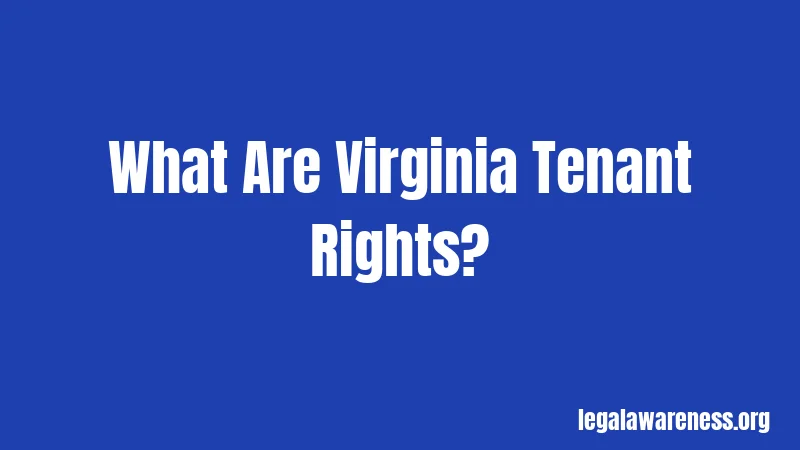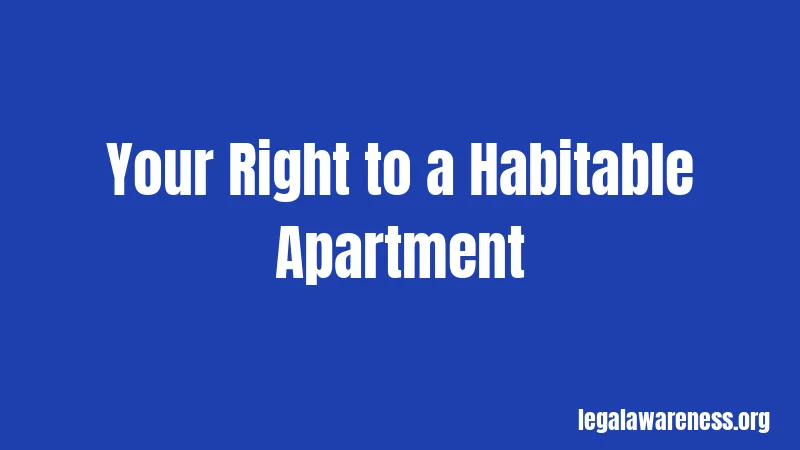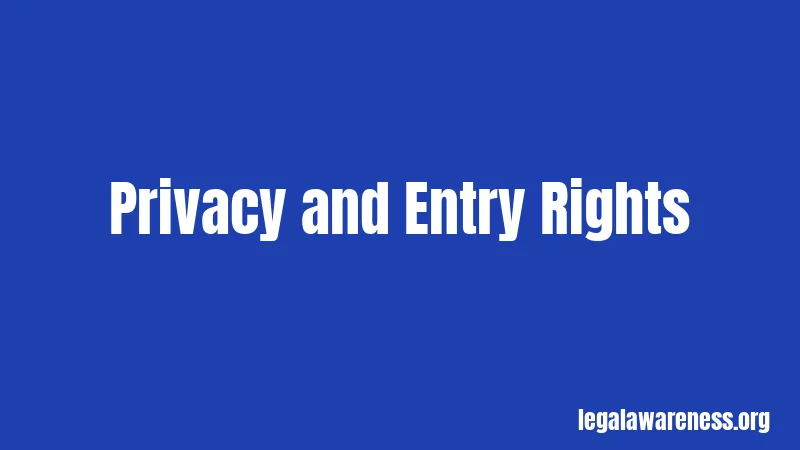Virginia Tenant Laws in 2026: Your Rights and Responsibilities
Most people don’t realize how much protection Virginia law gives to renters. Seriously. But here’s the thing: landlords can’t just do whatever they want. And you can’t either. Virginia has pretty solid rules about what both sides can and can’t do. Let’s break down exactly what you need to know so you can protect yourself.
Whether you’re renting for the first time or you’ve been doing it for years, understanding these laws matters. A lot. They cover everything from security deposits to repairs to eviction. Read through this, and you’ll know your rights.
What Are Virginia Tenant Rights?

Think of tenant rights like a rulebook for renting. Virginia law sets up basic protections for people who rent apartments, houses, or other properties. These laws say what landlords must do. They also say what landlords can’t do. Pretty straightforward, right?
The main law that covers all this is the Virginia Property Owners and Tenants Act. It’s pretty long, but basically it says landlords have to be fair. They have to maintain your apartment. They have to respect your privacy. And they can’t just kick you out without a good reason.
Security Deposits and Move-In Basics
Here’s where things get important. You’re gonna love this one because it protects your money.
Your landlord can ask for a security deposit. This is money you give upfront. It covers things like damage to the apartment beyond normal wear and tear. But here’s the catch: Virginia has strict rules about what your landlord can do with this money.
Your landlord must put your security deposit in a separate account. They can’t just throw it in with their own money. They also have to give you the name and address of where the money is being held. Within a certain timeframe after you move out, they must return your deposit or explain what happened to it.
Not sure what counts as normal wear and tear? Let me break it down. Normal wear and tear is basically what happens when you live somewhere normally. Paint fading is normal. Small nail holes for pictures are normal. A broken window from your own accident? That’s not normal wear and tear.
If your landlord keeps money from your deposit, they have to give you an itemized list. That means they explain each charge. They have to include receipts or estimates for repairs. If they don’t follow these rules, you might be able to get your money back plus extra damages.
Wait, it gets better. Virginia law says your landlord can’t charge you a non-refundable fee to move in. They can ask for the deposit and the first month’s rent. That’s it. Anything else labeled non-refundable is probably not allowed.
Your Right to a Habitable Apartment

Okay, pause. Read this carefully. This is probably the most important rule. Your landlord has to keep your apartment in habitable condition. This means it has to be safe and fit to live in.
What does habitable mean exactly? It means the building has to have working heat. You need running water and working plumbing. The floors and walls can’t be falling apart. The electrical system has to be safe. There can’t be dangerous bugs or mold taking over. It basically means the place has to be in decent enough shape that people can actually live there.
If something breaks, your landlord has to fix it. And they usually have to fix it pretty fast. If the heat goes out in winter, that’s urgent. Your landlord might have a few days to get heat back on. If it’s a minor issue like a cracked tile, they might have a bit longer.
Honestly, this is the part most people miss. You have the right to call someone to fix major problems. You don’t have to wait around wondering if your landlord will get to it eventually. If they don’t fix serious problems, you might be able to break your lease or withhold rent (though Virginia has specific procedures for this).
Maintenance and Repairs
Your landlord has to maintain the property. They have to keep it in good shape. This includes the main structure, the plumbing, and the electrical systems. Common areas like hallways have to be maintained too.
When you report a repair, your landlord should respond reasonably quickly. What’s reasonable depends on how serious it is. A leaking roof is urgent. A squeaky door is not.
Here’s where it gets interesting. You can’t just fix things yourself and deduct the cost from rent. Virginia has specific rules about this. You usually have to give your landlord notice first. You might have to go through some formal steps. But in some cases, if it’s a major problem and your landlord ignores it, you might have legal options.
Privacy and Entry Rights

Your landlord can’t just walk into your apartment whenever they want. This is your home. You have the right to privacy.
Virginia law says landlords need a good reason to enter. Common reasons are to make repairs, show the apartment to future renters, or deal with emergencies. Your landlord usually needs to give you notice before they come in. Most of the time, they need to give you at least 24 hours’ notice. They also need to enter at a reasonable time during normal business hours.
What about emergencies? If there’s a fire, flood, or other real emergency, your landlord doesn’t need to give notice. They can enter immediately. But they still can’t just pop in whenever they feel like it.
If your landlord enters without proper notice or without a good reason, that’s a violation of your rights. You might be able to take legal action.
Lease Agreements and Terms
Your lease is the contract between you and your landlord. It spells out the rules. Virginia law says your lease has to follow certain rules too.
The lease needs to clearly state the rent amount. It needs to say when rent is due. It should list any fees. It should explain what’s included (like utilities). Pretty basic stuff, but it matters.
Not all lease terms are legal. Your landlord can’t require you to waive your rights. For example, they can’t make you sign away your right to a habitable apartment. They can’t make you agree to illegal things. If they try, those parts of the lease aren’t enforceable.
Your landlord can set rules. No smoking. No loud noise after 10 p.m. No pets. That’s fair game. But the rules have to be reasonable. They have to be in the lease. And they can’t violate fair housing laws.
Rent and Payment Rules
Your rent amount is whatever you and your landlord agreed to. There’s no state cap on how much rent can be. But once you sign a lease, your landlord can’t raise the rent until the lease ends.
Month-to-month tenants have different rules. Your landlord can raise the rent. But they have to give proper notice. Usually, that’s 30 days’ notice in Virginia.
Rent is due on the date you agreed to. If it’s late, your landlord might charge a late fee. But the fee has to be reasonable. It usually can’t be more than 10% of the monthly rent, though this can vary by lease.
What about rent increases? If you’re on a lease, rent stays the same until the lease ends. If you’re month-to-month and your landlord wants to raise rent, they need to give 30 days’ notice. If you’re on a lease that’s ending, your landlord has to tell you about a rent increase before the lease ends.
Sound complicated? It’s actually not. The basic idea is simple: landlords can charge what you agreed to. They can’t surprise you with huge increases mid-lease. And if you’re month-to-month, they have to give reasonable notice before changing the price.
Eviction and Lease Termination
Let’s talk about the serious stuff. What happens if things go wrong?
Your landlord can’t just kick you out. They have to follow the law. In Virginia, there’s a specific process called eviction. It’s not quick. It requires going to court.
Your landlord needs a legal reason to evict you. Not paying rent is the most common reason. Breaking important lease terms is another. Not maintaining the apartment as a tenant is another. Landlords can’t evict you just because they feel like it. And they can’t evict you as punishment for asserting your rights.
The eviction process starts with a notice. Your landlord usually has to give you written notice. The type of notice depends on the reason. For non-payment of rent, you usually get a 5-day notice. This means you have 5 days to pay what you owe. If you pay, the eviction stops. If you don’t, your landlord can file in court.
For other violations (like breaking lease terms), your landlord might give you a 30-day notice to cure or quit. That means you have 30 days to fix the problem or move out.
Your landlord can’t do an illegal eviction. They can’t change the locks. They can’t throw your stuff out on the street. They have to go through the courts. If they try illegal eviction, you can take action against them.
What About Retaliation?
Here’s where it gets interesting. Your landlord can’t punish you for standing up for your rights. This is called retaliation, and it’s illegal in Virginia.
You’re protected if you report code violations. You’re protected if you complain about maintenance issues. You’re protected if you try to exercise your legal rights. Your landlord can’t raise your rent. They can’t decrease services. They can’t threaten eviction. All of this would be illegal retaliation.
Virginia law says if your landlord retaliates within 6 months of you asserting a right, it’s presumed to be illegal retaliation. Your landlord has to prove they had another reason. This puts the burden on them, which is good for you.
Fair Housing Laws
Wondering if fair housing laws apply in Virginia? They absolutely do. You can’t be discriminated against based on protected characteristics.
You can’t be denied housing based on race, color, religion, sex, national origin, familial status, or disability. These are federal protections. Virginia also adds protection for sexual orientation. This means landlords can’t refuse to rent to you based on who you are.
If your landlord tries to discriminate, that’s illegal. You can file a complaint with the Virginia Commission for the Promotion of Human Rights. You can also file with the federal Department of Housing and Urban Development.
Discrimination can be obvious or sneaky. A landlord who won’t rent to someone with a disability is clear discrimination. A landlord who suddenly changes their policies after you complain about repairs might be retaliating. Both are illegal.
Breaking Your Lease Early
Life happens. Sometimes you need to move before your lease ends. What are your options?
First, check your lease. Some leases have early termination clauses. These explain what happens if you leave early. You might have to pay a fee. You might owe the full rent for the remaining months. It depends on what you agreed to.
If your lease doesn’t address early termination, you still might have options. One option is to find someone to take over your lease. This is called subletting. Your new tenant would pay you rent. But your landlord has to agree to this. Most leases say the landlord has to approve any subletting.
Another option is to ask your landlord to release you. Some landlords will do this. Especially if you find a new tenant they approve of. But they don’t have to.
If you just leave without paying, that’s breaking the lease. Your landlord can sue you for the remaining rent. They can also damage your rental history. Future landlords might refuse to rent to you.
There’s one exception though. If your apartment becomes uninhabitable due to your landlord’s failure to maintain it, you might be able to break the lease without penalty. But this requires following specific legal procedures.
Recent Changes and Updates
Virginia has made some changes to tenant laws in recent years. Stay aware of what’s new.
One important recent development has been around eviction protections. Courts in Virginia are paying more attention to proper procedures. Landlords have to follow the rules exactly. If they don’t, the eviction might get thrown out.
Another area that’s been evolving is around security deposits. More attention is being paid to whether landlords follow the rules about returning deposits.
Honestly, the law is always changing a little. What matters is that you stay informed. If something major changes with your lease or situation, look it up. Or ask a lawyer.
How to Protect Yourself as a Tenant
Now, here’s what you should actually do. These are practical steps to protect yourself.
First, get everything in writing. Don’t rely on verbal promises. Your lease, any agreements about repairs, any promises about rent should all be in writing. Take photos of the apartment before you move in. Document the condition. This protects you when it’s time to move out.
Second, keep records of everything. Save copies of your lease. Keep rent payment records. Save texts, emails, or written notices from your landlord. If you report a repair, get it in writing. These records matter if there’s ever a dispute.
Third, communicate formally. If you need to report something, send an email or a written notice. Don’t just complain in person. Having it in writing creates proof of when you reported something.
Fourth, understand your lease before you sign it. Read it carefully. If something doesn’t make sense, ask questions. If you see something illegal, don’t sign. Or contact a lawyer.
Fifth, know the process for disputes. If something goes wrong, you have options. You might be able to file a complaint. You might be able to take legal action. You might be able to break the lease. But the exact process depends on the situation.
When to Get Legal Help
When should you get a lawyer involved? Let me break it down.
You might need legal help if your landlord is threatening eviction. An eviction lawyer can help protect your rights. You might need help if you’re dealing with retaliation. A lawyer can advise you on your options.
You might need help if there’s a major maintenance problem and your landlord refuses to fix it. You might need help if you think you’re being discriminated against. A lawyer can help you understand your rights and what you can do.
Virginia offers some free legal help. Legal aid organizations help people who can’t afford lawyers. If you qualify based on income, you might get free help. Contact your local bar association to find legal aid offices.
Don’t wait until there’s a huge problem. If you’re confused about something, ask a lawyer early. It’s often cheaper to prevent problems than to fix them later.
Frequently Asked Questions
Can my landlord keep my entire security deposit? No. Your landlord can only keep money for actual damages beyond normal wear and tear. They have to provide an itemized list with receipts. If they don’t follow the rules, you can take legal action to get your money back.
How much notice does my landlord need to enter my apartment? Usually 24 hours’ notice, and it has to be at a reasonable time during business hours. Emergencies are an exception. Your landlord can enter immediately if there’s a fire, flood, or other real emergency.
What should I do if my landlord won’t make repairs? Document the problem with photos and written reports. Give your landlord written notice. Keep records of your requests. If they ignore serious maintenance issues, you might have legal options like withholding rent or breaking the lease (following proper legal procedures).
Can my landlord raise my rent in the middle of my lease? No. Your rent stays the same for the duration of your lease. If you’re month-to-month, your landlord can raise rent but has to give 30 days’ notice.
Is it illegal for my landlord to retaliate against me? Yes. Your landlord can’t punish you for reporting maintenance issues, code violations, or asserting your legal rights. Retaliation is illegal, and you can take action if it happens.
What happens if I can’t pay my rent? Contact your landlord immediately. Explain the situation. Maybe you can work something out. If you don’t pay, your landlord can start the eviction process. You’ll get notice, but if you don’t resolve it, you could end up in court or evicted.
Can I break my lease early? It depends on your lease. Check what it says about early termination. You might be able to sublease or find someone to take over. You can also try asking your landlord to release you. But generally, if you break the lease, your landlord can sue for remaining rent.
Final Thoughts
Okay, so here’s what you really need to remember. Virginia law protects tenants more than people realize. You have the right to a habitable apartment. You have privacy rights. Your landlord can’t retaliate against you. Your security deposit is protected.
But you also have responsibilities. You have to pay rent on time. You have to follow the lease terms. You have to take care of the property. It’s a two-way street.
The best thing you can do is understand your rights. Keep good records. Communicate clearly with your landlord. Most problems can be solved if both sides follow the rules.
Now you know the basics. Stay informed, stay safe, and when in doubt, reach out to a lawyer or a legal aid organization. You’ve got this.
References
Virginia Property Owners and Tenants Act
